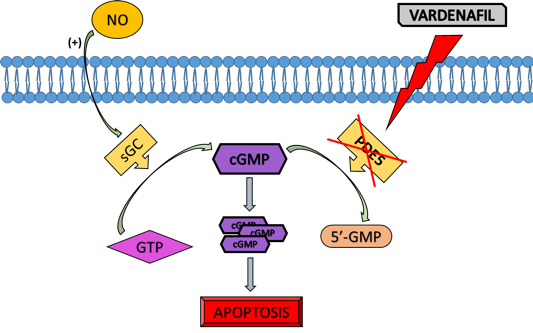ROLE OF CYCLIC GUANOSINE MONOPHOSPHATE IN THYROID CANCER
ROLE OF CYCLIC GUANOSINE MONOPHOSPHATE IN THYROID CANCER
The cyclic guanosine monophosphate (cGMP) is one of the most relevant regulators of a variety of physiological and pathophysiological processes in many tissues, including the thyroid gland. cGMP is involved in the regulation of many protein-dependent kinases, such as protein kinase G (PKG), and it is degraded by a specific enzyme called phosphodiesterase-5 (PDE5), which control the intracellular accumulation of the cyclic nucleotide. PDE5 is mainly studied in vivo for erectile dysfunction, condition for which many drugs, such as Vardenafil, have already been produced. They are PDE5 inhibitors that prevent cGMP degradation and consequently the relaxation of the corpus cavernosumconstituting the penis. Moreover, cGMP and other cyclic nucleotides are demonstrated to be involved in proliferation and cellular apoptosis, suggesting the possible use of PDE5 inhibitors in tumor treatment.
Thyroid cancer is one of the most common endocrine tumors and, particularly, follicular thyroid cancer (FTC) is the second in frequency, about 10 to 15% of all thyroid cancer. The objective of our study is to investigate the potential role of Vardenafil in the pathophysiology of the FTC in vitro and to highlight the pathway through which cellular apoptosis occurs, considering the use of PDE5 inhibitor as a promising therapeutic approach for antitumoral therapy.


